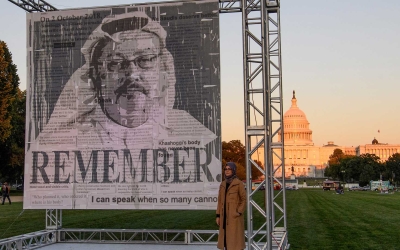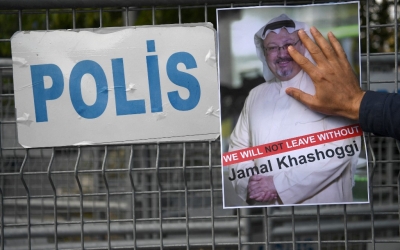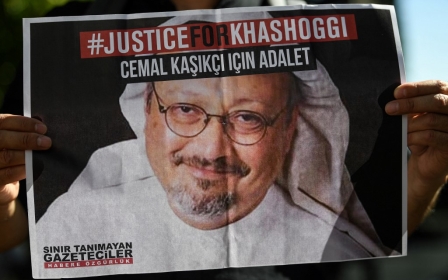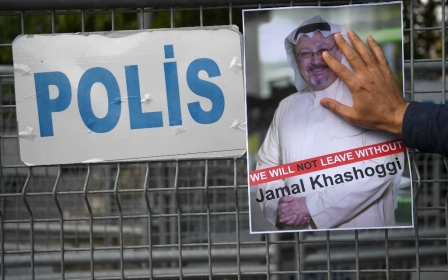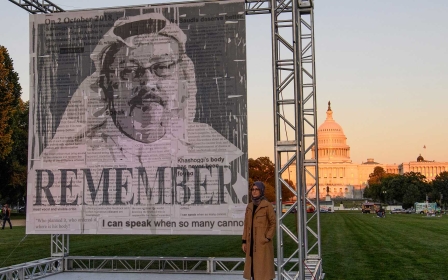Khashoggi fiancee to appeal Turkey court's decision to transfer murder trial to Riyadh
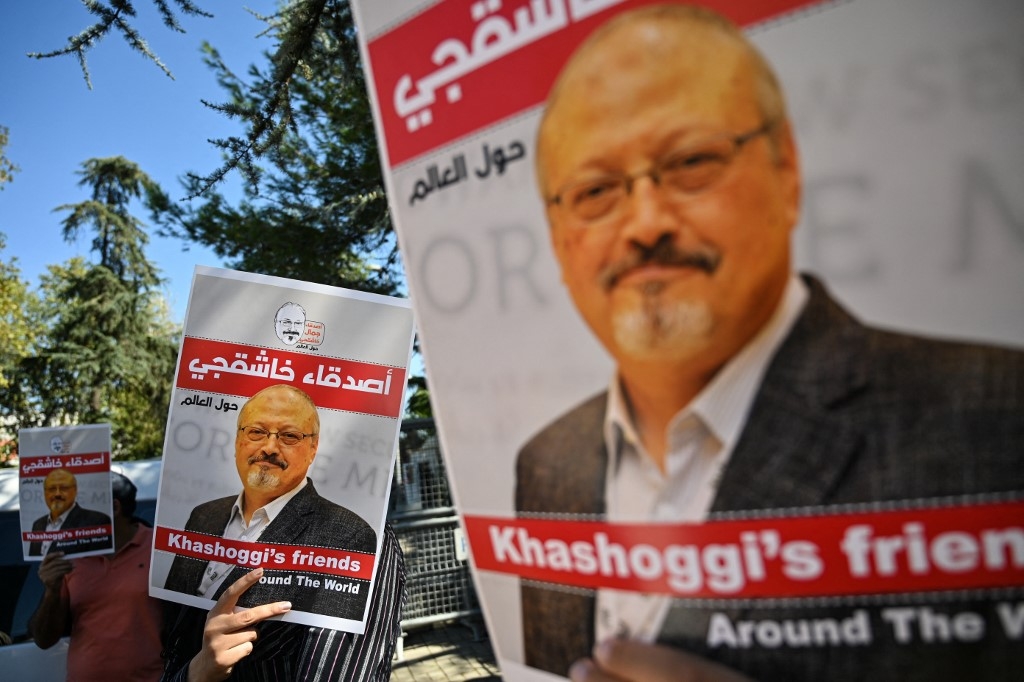
Hatice Cengiz, the fiancee of murdered Saudi critic Jamal Khashoggi, said on Thursday that she would appeal a Turkish court's decision to hand to Saudi Arabia a case involving 26 suspects linked to his killing.
Turkey "is not ruled by a family like in Saudi Arabia. We have a justice system that addresses citizens' grievances," Cengiz, the plaintiff in the case, told journalists outside Istanbul's main court.
"We will appeal the decision in line with our legal system".
Earlier on Thursday, the Turkish judge had confirmed: "We decided to halt and hand over the case to Saudi Arabia."
The 59-year-old Washington Post and Middle East Eye columnist was killed inside the Saudi consulate in Istanbul on 2 October 2018 in a gruesome murder that shocked the world.
New MEE newsletter: Jerusalem Dispatch
Sign up to get the latest insights and analysis on Israel-Palestine, alongside Turkey Unpacked and other MEE newsletters
Earlier, one of Cengiz's lawyers said during the hearing that there were no grounds to pass the case to Saudi Arabia.
“We have already submitted a motion to stop the execution of the justice ministry’s memorandum to transfer the case to Saudi Arabia. And this court should wait for it,” said Gokmen Baspinar.
“There is no judicial cooperation deal between Turkey and Saudi Arabia. And Saudi Arabia isn't a party to any international treaties that Turkey has signed.
"The trial has already ended in Saudi Arabia. Therefore the trial must continue in Turkey."
'Get away with murder'
Human Rights Watch had urged Turkey on Wednesday against transferring the trial, saying it would end any possibility of justice for Khashoggi.
Ankara-Riyadh relations worsened significantly after the killing, but Turkey has since sought to mend ties with Saudi Arabia to bolster its economy.
"Transferring the Khashoggi trial from Turkey to Saudi Arabia would end any possibility of justice for him, and would reinforce Saudi authorities' apparent belief that they can get away with murder," said Michael Page, deputy Middle East director at Human Rights Watch, on Wednesday.
"Turkish authorities should reverse their decision and not contribute any further to entrenching Saudi impunity by handing over the Khashoggi case to the very people implicated in his murder."
'Regional realpolitik'
A US intelligence report released a year ago said Saudi Arabia's de facto ruler Crown Prince Mohammed bin Salman had approved the operation to kill or capture Khashoggi, but the Saudi government denied any involvement by the crown prince and rejected the report's findings.
For years, Riyadh has been pressuring Ankara to drop the trial and has claimed its own legal proceedings, in which 18 individuals were charged with involvement in the murder, were sufficient.
But according to the Guardian, at least three members of the Saudi hit squad were residing and working "in seven-star accommodation" at a government-run security compound in Riyadh.
Cengiz told MEE last week that she was shocked by the prosecutor's demand, and was very sad to see that things had reached this point.
However, earlier this year she had noted that the recent thaw in ties between Turkey and Saudi Arabia was a sign of the disappointment to come in her search for justice and closure.
"Turkey's regional realpolitik in resolving tensions with other countries shouldn't include sacrificing justice for Jamal Khashoggi," said Page.
"The decision to transfer the case will be a shameful indictment of the Turkish authorities’ willingness to whitewash assassinations by foreign governments on their territory."
'Pandora’s box'
With Turkish President Recep Tayyip Erdogan expected to visit Riyadh in the coming weeks, three-and-a-half years after Saudi Arabia imposed a boycott on Turkish goods over the Khashoggi affair, the Saudi crown prince is attempting to use the visit as leverage to get a definitive end to the Khashoggi affair.
“For MBS, it's all about Khashoggi. He is obsessed by it. It's personal. He blames Erdogan personally for getting America involved and for not closing the affair down within the first few days,” one source with knowledge of the negotiations told MEE, using a common nickname for bin Salman.
In addition to the Turkish case, there remains a second lawsuit in a US federal court.
This was filed by Cengiz, and the US-based advocacy group Democracy for the Arab World Now (Dawn), which Khashoggi established and ran before his death.
This lawsuit, Turkish officials argue, is beyond their reach.
“Turkey is withdrawing the Khashoggi case in Istanbul and it is a legal decision,” one Turkish official told MEE, stressing that Ankara has no control over the US case and has not discussed or negotiated over cases outside Turkey with Saudi authorities.
“Turkey doesn’t have any purview over the foreign court cases against the Saudi crown prince,” he added.
“It is solely within Hatice Cengiz’s powers whether to pursue those cases. However, many people, including Khashoggi family members, have been pressuring Cengiz to drop all cases. I wouldn't be surprised if she did that. But she could also get more adamant on pressing on. It is up to her.”
The judge in the lawsuit in Washington DC has yet to rule whether the court has jurisdiction. If he does, the lawsuit could open what one source described as a “pandora’s box” of information, with the court potentially demanding the crown prince give evidence in person.
Middle East Eye delivers independent and unrivalled coverage and analysis of the Middle East, North Africa and beyond. To learn more about republishing this content and the associated fees, please fill out this form. More about MEE can be found here.


